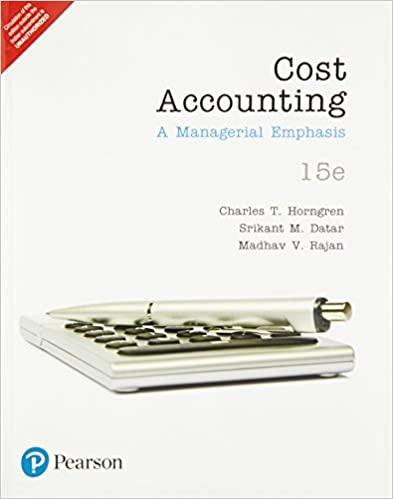Question
CH. 17 TMM.17-1 TMM.17-APP EX.17-01 EX.17-05.ALGO EX.17-06.ALGO EX.17-10.ALGO PR.17-03B.ALGO Hide or show questions Progress:7/7 items eBook Calculator Equivalent Units and Related Costs; Cost of Production
CH. 17
TMM.17-1
TMM.17-APP
EX.17-01
EX.17-05.ALGO
EX.17-06.ALGO
EX.17-10.ALGO
PR.17-03B.ALGO
Hide or show questions
Progress:7/7 items
eBook
Calculator
Equivalent Units and Related Costs; Cost of Production Report; Entries
Dover Chemical Company manufactures specialty chemicals by a series of three processes, all materials being introduced in the Distilling Department. From the Distilling Department, the materials pass through the Reaction and Filling departments, emerging as finished chemicals.
The balance in the account Work in ProcessFilling was as follows on January 1:
| Work in ProcessFilling Department | ||
| (2,300 units, 60% completed): | ||
| Direct materials (2,300 x $17.3) | $39,790 | |
| Conversion (2,300 x 60% x $11.3) | 15,594 | |
| $55,384 | ||
The following costs were charged to Work in ProcessFilling during January:
| Direct materials transferred from Reaction | ||
| Department: 29,700 units at $17.1 a unit | $507,870 | |
| Direct labor | 167,300 | |
| Factory overhead | 160,748 | |
During January, 29,400 units of specialty chemicals were completed. Work in ProcessFilling Department on January 31 was 2,600 units, 10% completed.
Required:
1. Prepare a cost of production report for the Filling Department for January. If an amount is zero, enter "0". If required, round your cost per equivalent unit answers to two decimal places.
| Dover Chemical Company | |||
| Cost of Production Report-Filling Department | |||
| For the Month Ended January 31 | |||
| Unit Information | |||
| Units charged to production: | |||
| Inventory in process, January 1 | |||
| Received from Reaction Department | |||
| Total units accounted for by the Filling Department | |||
| Units to be assigned costs: | |||
| Equivalent Units | |||
| Whole Units | Direct Materials | Conversion | |
| Inventory in process, January 1 | |||
| Started and completed in January | |||
| Transferred to finished goods in January | |||
| Inventory in process, January 31 | |||
| Total units to be assigned costs | |||
| Cost Information | |||
| Costs per equivalent unit: | |||
| Direct Materials | Conversion | ||
| Total costs for January in Filling Department | $ | $ | |
| Total equivalent units | |||
| Cost per equivalent unit | $ | $ | |
| Costs charged to production: | |||
| Direct Materials | Conversion | Total | |
| Inventory in process, January 1 | $ | ||
| Costs incurred in January | |||
| Total costs accounted for by the Filling Department | $ | ||
| Cost allocated to completed and partially completed units: | |||
| Inventory in process, January 1 balance | $ | ||
| To complete inventory in process, January 1 | $ | ||
| Cost of completed January 1 work in process | $ | ||
| Started and completed in January | $ | ||
| Transferred to finished goods in January | $ | ||
| Inventory in process, January 31 | |||
| Total costs assigned by the Filling Department | $ | ||
Feedback
1. Calculate equivalent units for materials and conversion costs. Calculate the cost per equivalent unit for materials and conversion costs. Calculate the costs assigned to the beginning inventory, the units started and completed, and the ending inventory.
2. Journalize the entries for (1) costs transferred from Reaction to Filling and (2) the cost transferred from Filling to Finished Goods.
| (1) | Work in Process-Filling Department | ||
| Work in Process-Reaction Department | |||
| (2) | Finished Goods | ||
| Work in Process-Filling Department |
Feedback
2. Remember that there are three types of inventory; materials, work in process, and finished goods. What costs are captured in the work in process account? Are these units 100% complete or are they being transferred to another department?
3. Determine the increase or decrease in the cost per equivalent unit from November to January for direct materials and conversion costs. If required, round your answers to two decimal places.
| Increase or Decrease | Amount | |
| Change in direct materials cost per equivalent unit | Decrease | $ |
| Change in conversion cost per equivalent unit | Increase | $ |
Step by Step Solution
There are 3 Steps involved in it
Step: 1

Get Instant Access to Expert-Tailored Solutions
See step-by-step solutions with expert insights and AI powered tools for academic success
Step: 2

Step: 3

Ace Your Homework with AI
Get the answers you need in no time with our AI-driven, step-by-step assistance
Get Started


